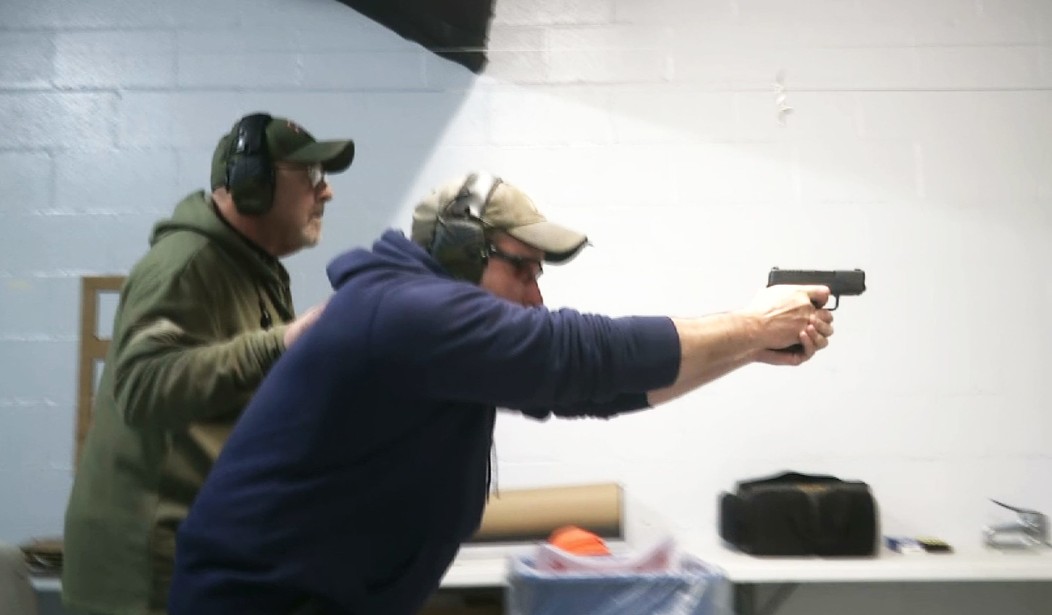Outnumbered he may be, but New York state Sen. Rob Ortt (R) promises to fight four gun proposals Democrats are backing next year. Since they control Albany following the midterms, Ortt realizes any debate could only be the precursor to a sweeping legislative victory for gun-control advocates. But he’s not about to concede defeat.
New York Democrats want “Red Flag” legislation passed, which would let police officers, family members, or even school officials tell a judge why a person poses such a danger that their weapons should be confiscated.
Another proposal would make gun buyers wait up to 10 days for a delayed background check, and yet another bill would ban bump stocks.
But, the most egregious of the Democrats’ proposals, as far as Ortt is concerned, is one that would allow police to go through years of a person’s social media and search engine history before they are allowed to buy a gun.
“The First Amendment, the Fourth Amendment. You’re asking someone to have to provide their password, which is a very sensitive and rightfully so aspect for most people,” Ortt said to WIVB-TV. “We’re getting into subjectivity. What would constitute a reason to deny someone their pistol permit?”
But it makes perfect sense to the bill’s sponsor, Sen. Kevin Parker.
“Although New York State has some of the strictest gun laws in the country, we can no longer provide protection to gun owners at the expense of the rest of society,” Parker wrote in a memo attached to the legislation.
The Brooklyn Democrat wants local police to be able to examine three years of a prospective gun buyer’s media posts and one year of their search engine history before deciding whether the applicant should get a handgun permit or be allowed to buy guns classified as “assault weapons.”
Police would look for “commonly known profane slurs or biased language” under the legislation, as well as posts described as “threatening another person,” or even anything else “deemed necessary by the New York state police.”
Parker said he introduced the bill in response to the Tree of Life synagogue shooting in Pittsburgh. Eleven people died in the attack. Parker said Robert Bowers, who has pleaded not guilty in the attack, made no secret of his anti-Semitism through social media postings before the October shooting.
In addition to the Pittsburgh shooting, Parker pointed to the social media history of Cesar Sayoc, a Florida man, who police say mailed 16 bombs to CNN, politicians and national security officials.
“We’re in a new age with new technology, and we need new rules,” Parker said. “So we need to begin a conversation about the way that we monitor social media and use that in the context of giving out dangerous weapons that can, in fact, hurt or kill people.”
Tom King, president of the New York Rifle and Pistol Association, said Parker’s bill is a direct violation of the First Amendment.
“This is the slippery search toward regulating all of our rights,” King said. “Isn’t posting on social media protected speech? This would put a chill on your voice and add a chill to your First Amendment rights.”
But Parker told the Democrat and Chronicle that, if anything, his bill doesn’t go far enough.
“Ask the families of the people who were murdered in Pittsburgh if they thought it would be too far to make sure that that murderer didn’t get his hands on a dangerous weapon,” Parker said.
However, Rod Watson, a Buffalo News columnist, argued Parker’s proposal is more than a simple violation of gun buyers’ constitutional rights.
Watson used the word “chilling” to describe Parker’s proposal. Watson said police should be able to react to warning signs posted online, as were evident in the case of Omar Mateen, who killed 49 people at the Pulse nightclub in Orlando in 2016.
Watson does not want to see New York police permitted to go through years of social media history on nothing but a fishing expedition. Attorney Max Tresmond told Watson that Parker’s bill amounts to giving police the ability to “punish you for things you haven’t done.”
Tresmond also pointed out that the law would only impact law-abiding citizens because criminals, by and large, don’t file for a gun permit or permission to buy an assault weapon.
“One hardly need be a constitutional scholar to recognize this blanket permission slip constitutes a blatant assault on free speech and an intrusion on privacy rights with no semblance of due process or judicial review,” Watson wrote.
“I normally reject the slippery slope argument because life is about drawing lines. But when it comes to gun rights, there is no line opponents will not cross,” Watson concluded. “And this one carries implications not just for those who care about gun rights, but those who care about rights in general.”









Join the conversation as a VIP Member